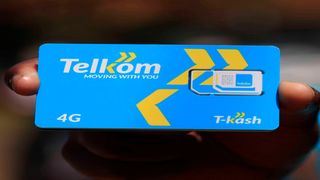
A subscriber holds a 4G Telkom SIM card in Nyeri town on September 1, 2020. Ownership of a Dubai-based company poised to inherit 60pc stake in Telkom Kenya remains scanty.
| File | Nation Media GroupWeekly Review
Premium
Intrigues behind Sh6bn Telkom deal
There were still more questions than answers even as the National Treasury announced that a Dubai-based entity, Infrastructure Corporation of Africa LLC (ICA), had acquired a 60 per stake in Telkom Kenya.
Is it a telecommunications company or just a special-purpose vehicle set up for this specific transaction? Where is the evidence that this company has money to invest in Telkom Kenya? Can the government release the term sheets so the taxpayer can see whether or not this is another asset stripper and that Telkom’s assets are protected?
Initially, the signal out there was that the government and the British private equity group, Helios Investment Partners LLP, were headed for an explosive legal collision course.
Indeed, the tone of the statement the Cabinet dispatched on Wednesday was terse and strident.
“The Cabinet has rescinded the decision that the government of Kenya shall purchase from Helios 60 per cent of the ordinary shares of Telkom Kenya. By didn’t of this Cabinet decision, Helios will refund to the government of Kenya the amount paid as consideration for the takeover,” it stated.
As it turned out, the Cabinet dispatch was just but an exercise in political correctness. It was merely playing to the public gallery by projecting the misleading notion that President William Ruto’s administration had taken the bold step to rescind an opaque deal entered into by the government of former President Uhuru Kenyatta.
The government was not about to start a fight with Helios by demanding the Sh6 billion which it paid to the firm for the 60 per cent stake in Telkom Kenya on August 12, with the deal expediently timed to happen just days before President Ruto was sworn in.
In less than 24 hours, Treasury Cabinet Secretary Prof Njuguna Ndungu had been forced to climb down from the strident rhetoric contained in the Cabinet dispatch and to clear the air over the perception that Kenya was about to demand to be repaid its billions. “In order to complete the process of on-boarding of ICA, the government will work with Helios to transfer their 60 per cent directly to ICA. This process will inevitably require rescinding of the transaction documents already signed between the government and Helios, among other necessary actions,” Prof Ndung’u said.
Financial and policy experts have described it as a convoluted and opaque transaction. Yet, however convoluted, the reason and motive behind the on-boarding of the Dubai entity into Telkom Kenya in the manner the government has done is hidden in plain sight.
Clearly, the main motive is to circumvent the rigorous laws and procedures for procuring a transparent privatisation process. The administration had calculated that a proper privatisation was going to involve too much public scrutiny, including parliamentary approval.
A new scheme had been hatched up with a strategy that runs as follows: First, exploit the fact that even though Helios was paid Sh6 billion to hand back the 60 per cent shareholding in Telkom Kenya to the government, the transaction was not completed because Telkom had no quorum and, therefore, could not pass the necessary resolutions to facilitate both the transfer of shares at the company registry, and the novations of the shareholder loans to the government that were part of the transaction.
Secondly, exploit the fact that since the actual transfer of shares did not happen, bring Helios back into the picture to be the party to transfer ownership of Telkom to the Dubai Company.
Thirdly, make the new investor (ICA) to sign a new share purchase agreement with Helios while simultaneously cancelling the one that was signed in August 2022.Fourthly, the new investor will then refund the government the amount of Sh6 billion and commit to invest money in Telkom.
How events will unfold in the coming months is still unclear. But until the government comes out to disclose the details of term sheets, including proof of payment and the full terms under the Dubai entity is being on-boarded as new owner of Telkom, the transaction will continue to be mired in controversy.
In a sense and if you compress the time between the Sh6 billion payment was made and the current deal, this one has the hallmarks of what corporate finance junkies call a back-to-back transaction.
Indeed, back-to-back corporate finance deals where one flows into another simultaneously are not unknown in Kenya. Kenya has its notable example – Celtel’s entry into the market in 2004 through acquisition of Kencell.
In that transaction, the previous majority owner, Vivendi, had signalled its intent to exit. A sale process revealed a price, which then prompted the minority shareholder, Sameer Group, to exercise its pre-emptive rights and offer to buy the Vivendi stake for the revealed price.
Simultaneously, Merali struck a deal with Celtel to sell this stake after ensuring that all regulatory procedures were in place.
All that had to happen then was for Sameer to consummate its purchase of Vivendi’s stake and then turn around and sell the same to Celtel. Merali made big bucks from this transaction.





